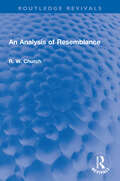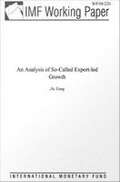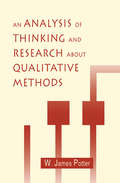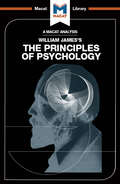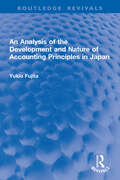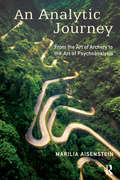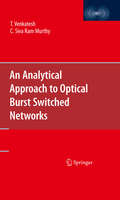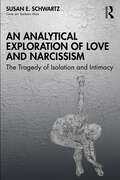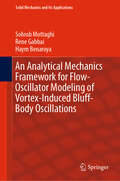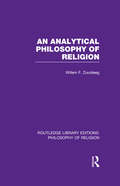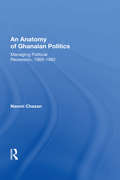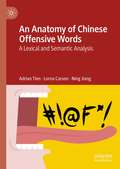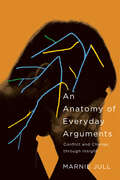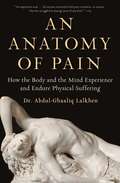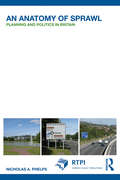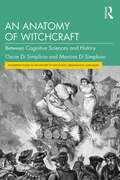- Table View
- List View
An Analysis of Resemblance (Routledge Revivals)
by Ralph W. Church dec'dFirst published in 1952, An Analysis of Resemblance has two-fold aims. The opening chapters seek to present what it is not about. It is not concerned with any sense of resemblance in which that term is used by thinkers generally and widely called Hegelian Idealists. The several subsequent chapters of the work advance an analysis of four senses of resemblance. Two of these four senses would seem to be radical – in the etymological sense of the term. The other two senses are derivative. The concluding chapter advances some considerations as to the bearing of an analysis of resemblance on the matters of universals and taxonomy. Professor Church’s clearly stated ideas will arouse much discussion among students of philosophy. This book helps to round off his studies in this field and is a worthy successor to his earlier works.
An Analysis of Sandra M. Gilbert and Susan Gubar's The Madwoman in the Attic: The Woman Writer and the Nineteenth-Century Literary Imagination (The Macat Library)
by Rebecca PohlThe 1979 publication of Susan Gubar and Sandra M. Gilbert’s ground-breaking study The Madwoman in the Attic marked a founding moment in feminist literary history as much as feminist literary theory. In their extensive study of nineteenth-century women’s writing, Gubar and Gilbert offer radical re-readings of Jane Austen, the Brontës, Emily Dickinson, George Eliot and Mary Shelley tracing a distinctive female literary tradition and female literary aesthetic. Gubar and Gilbert raise questions about canonisation that continue to resonate today, and model the revolutionary importance of re-reading influential texts that may seem all too familiar
An Analysis of So-Called Export-led Growth
by Jie YangA report from the International Monetary Fund.
An Analysis of Thinking and Research About Qualitative Methods (Routledge Communication Series)
by W. James PotterWritten for social science scholars who want to learn more about the qualitative way of thinking, this book addresses the full continuum of issues about the qualitative methodologies. At one end of that continuum are the deeply philosophical concerns of ontology and epistemology. At the other -- concrete -- end of that continuum are the practical issues of what is considered evidence: How does one go about gathering evidence? Where, when, and how does one analyze evidence? What are the alternative ways of dealing with tone and voice in writing qualitative research? The attention to practical, concrete issues makes this book useful as a handbook providing a great deal of vital information to scholars who want a guide to making decisions as they navigate their research questions through the qualitative realm. Uniquely qualified to write such a book, Potter has earned PhDs in both qualitative methods (with a concentration in linguistics and field studies) and in quantitative methods (with a concentration in social science theory and statistics). The book is not an ideological argument that glorifies one system of thinking while attempting to persuade the reader that other systems of thinking are bankrupt. Rather, the book presents a respectful, balanced analysis of the strengths and weaknesses of the qualitative approach. The book builds to a controversial final chapter entitled "Is Convergence a Possibility?" in which Potter synthesizes a conclusion from his analysis of a wide range of qualitative studies across three broad topic areas -- text focused research, audience focused research, and institution focused research -- and across seven major qualitative methodologies -- ethnography, ethnomethodology, reception study, ecological psychology, symbolic interactionism, cultural studies, and textual analysis. His conclusion is that not only is there a possibility of a convergence between qualitative and quantitative approaches, but that the convergence has already happened. The book includes an appendix in which 95 books and articles using the qualitative approach are abstracted and analyzed to illustrate key points of methodology and methods. It also includes subject and author indexes.
An Analysis of William James's The Principles of Psychology
by The Macat TeamThe impact of William James’s 1890 The Principles of Psychology is such that he is commonly known as the father of his subject. Though psychology itself is a very different discipline in the 21st-century, James’s influence continues to be felt – both within the field and beyond. At base, Principles was designed to be a textbook for what was then an emerging field: a summary and explanation of what was known at that point in time. As its continuing influence shows, though, it became far more – a success due in part to the strength of James’s analytical skills and creative thinking. On the one hand, James was a masterful analyst, able to break down what was known in psychology, to trace how it fitted together, and, crucially, to point out the gaps in psychologists’ knowledge. Beyond that, though, he was a creative thinker, who looked at things from different angles and proposed inventive solutions and hypotheses. Among his best known was an entirely new theory of emotion (the James-Lange theory), and the influential notion of the “stream of consciousness” – the latter of which has influenced generations of psychologists and artists alike.
An Analysis of the Development and Nature of Accounting Principles in Japan (Routledge Revivals)
by Yukio FujitaAn Analysis of the Development and Nature of Accounting Principles in Japan (1991) explores the historical development of accounting principles in Japan. The book aims to increase understanding and knowledge of the international dimensions of accounting.
An Analysis of the Underground Economy and Its Macroeconomic Consequences
by Era Dabla-Norris Andrew FeltensteinA report from the International Monetary Fund.
An Analytic Journey: From the Art of Archery to the Art of Psychoanalysis
by Marilia AisensteinThis book is a journey through almost forty years of practice. Each chapter is independent of the others and develops around a specific theme: psychoanalysis in France, the transference, fathers today, psychic bisexuality, the sick body, human destructivity, and so on. The underlying thread is none the less the question of knowing how the drive operates between the biological body and mental functioning consisting of representations and affects, and, especially, how it gives rise to thinking. If thinking is an "act of the flesh", as the author asserts, how can we refine our understanding of the vicissitudes of the "mysterious leap from the mind to the body"? Furthermore, how does Freudian metapsychology still help us today in our encounters with patients? Contemporary clinical practice is sometimes bewildering: acts, violence, pain, and somatization often replace neurotic conflicts and speech. The clinical stories related here have the aim of showing that a psychoanalysis rooted in the Freudian corpus is still alive and can continue to offer creative responses today.
An Analytical Approach to Optical Burst Switched Networks
by C. Siva Murthy T. VenkateshThis book presents the state of the art results on modeling and analysis of OBS networks. It provides researchers with new directions for future research and helps them gain a better understanding of modeling OBS networks. This book classifies all the literature on modeling and analysis of OBS networks and serves as a thought provoking material for the researchers working on the analysis of high-speed networks. The scope of this book however is not limited to OBS networks alone but extends to high-speed communication networks with limited or no buffers.
An Analytical Exploration of Love and Narcissism: The Tragedy of Isolation and Intimacy
by Susan E. SchwartzThis book reflects the psychic wounds of narcissism from the perspective of Jungian analytical psychology. Oriented towards the richness and plurality of the psyche, it sheds light on clinical practice as well as the common and intricate issues of this personality type.Narcissism is described as a grandiose sense of self, exhibitionistic, needing reassurance, but suffering in disturbed relationships. The perspective of Jungian analytical psychology expands the symbolism within narcissism. Clinical examples, dreams, the myth of Narcissus and Echo, and basic Jungian concepts move us further into the psyche. Topics covered are: what narcissism is and why it’s misunderstood, and if narcissists are capable of love and their perfectionist burden. It explores how to forge knowledge and emotional transformation with a narcissist in clinical treatment and all relationships.Exploring this complex and intriguing phenomenon, the book will appeal to readers and therapists from various fields including psychoanalysis, general psychology, gender studies, culture, and sociology.
An Analytical Mechanics Framework for Flow-Oscillator Modeling of Vortex-Induced Bluff-Body Oscillations (Solid Mechanics and Its Applications #260)
by Haym Benaroya Sohrob Mottaghi Rene GabbaiThis self-contained book provides an introduction to the flow-oscillator modeling of vortex-induced bluff-body oscillations. One of the great challenges in engineering science also happens to be one of engineering design – the modeling, analysis and design of vibrating structures driven by fluid motion. The literature on fluid–structure interaction is vast, and it can be said to comprise a large fraction of all papers published in the mechanical sciences. This book focuses on the vortex-induced oscillations of an immersed body, since, although the importance of the subject has long been known, it is only during the past fifty years that there have been concerted efforts to analytically model the general behavior of the coupling between vortex shedding and structural oscillations. At the same time, experimentalists have been gathering data on such interactions in order to help define the various regimes of behavior. This data is critical to our understanding and to those who develop analytical models, as can be seen in this book. The fundamental bases for the modeling developed in this book are the variational principles of analytical dynamics, in particular Hamilton’s principle and Jourdain’s principle, considered great intellectual achievements on par with Newton’s laws of motion. Variational principles have been applied in numerous disciplines, including dynamics, optics and quantum mechanics. Here, we apply variational principles to the development of a framework for the modeling of flow-oscillator models of vortex-induced oscillations.
An Analytical Philosophy of Religion (Routledge Library Editions: Philosophy of Religion)
by Willem Frederik ZuurdeegThis original study, published initially in 1959, introduces students of philosophy and of theology to a treatment of religion based upon the methods of modern philosophy – particularly logical empiricism and existentialism. Above and beyond the importance of its point of view, this book is distinguished by its clarity and by its objective and understanding presentation of diverse points of view.
An Anatomy Of Ghanaian Politics: Managing Political Recession, 1969-1982
by Naomi ChazanThe paths of African states have diverged markedly since the termination of colonial rule. Nevertheless, Ghana, the first African state to achieve independence, epitomizes both the political gyrations and the overall stagnation common to many other countries on the continent. This work concentrates on the 1969–1982 period in Ghana, focusing on two interrelated facets of African politics: the decline of state power and authority, and adjustments to political recession. The author traces the dual patterns of diminution of the state and the adaptation of autonomous coping mechanisms in the separate spheres of political leadership, political structures and institutions, ideology, and political economy. The dynamic of state-society interactions is then treated in terms of the rhythm of dissent, conflict, and disengagement. Dr. Chazan provides a comprehensive study of Ghanaian politics from the 1970s to the present. By systematically analyzing the process of political decline and regeneration, she highlights similar processes apparent elsewhere in Africa. The stress on the subtleties and direction of political change has important implications for policymakers and policy analysts alike.
An Anatomy of Addiction: Sigmund Freud, William Halsted, and the Miracle Drug Cocaine
by Howard MarkelFrom acclaimed medical historian Howard Markel, author of When Germs Travel, the astonishing account of the years-long cocaine use of Sigmund Freud, young, ambitious neurologist, and William Halsted, the equally young, pathfinding surgeon. Markel writes of the physical and emotional damage caused by the then-heralded wonder drug, and how each man ultimately changed the world in spite of it--or because of it. One became the father of psychoanalysis; the other, of modern surgery. Both men were practicing medicine at the same time in the 1880s: Freud at the Vienna General Hospital, Halsted at New York's Bellevue Hospital. Markel writes that Freud began to experiment with cocaine as a way of studying its therapeutic uses--as an antidote for the overprescribed morphine, which had made addicts of so many, and as a treatment for depression. Halsted, an acclaimed surgeon even then, was curious about cocaine's effectiveness as an anesthetic and injected the drug into his arm to prove his theory. Neither Freud nor Halsted, nor their colleagues, had any idea of the drug's potential to dominate and endanger their lives. Addiction as a bona fide medical diagnosis didn't even exist in the elite medical circles they inhabited. In An Anatomy of Addiction, Markel writes about the life and work of each man, showing how each came to know about cocaine; how Freud found that the drug cured his indigestion, dulled his aches, and relieved his depression. The author writes that Freud, after a few months of taking the magical drug, published a treatise on it, Über Coca, in which he described his "most gorgeous excitement." The paper marked a major shift in Freud's work: he turned from studying the anatomy of the brain to exploring the human psyche. Halsted, one of the most revered of American surgeons, became the head of surgery at the newly built Johns Hopkins Hospital and then professor of surgery, the hospital's most exalted position, committing himself repeatedly to Butler Hospital, an insane asylum, to withdraw from his out-of control cocaine use. Halsted invented modern surgery as we know it today: devising new ways to safely invade the body in search of cures and pioneering modern surgical techniques that controlled bleeding and promoted healing. He insisted on thorough hand washing, on scrub-downs and whites for doctors and nurses, on sterility in the operating room--even inventing the surgical glove, which he designed and had the Goodyear Rubber Company make for him--accomplishing all of this as he struggled to conquer his unyielding desire for cocaine. An Anatomy of Addiction tells the tragic and heroic story of each man, accidentally struck down in his prime by an insidious malady: tragic because of the time, relationships, and health cocaine forced each to squander; heroic in the intense battle each man waged to overcome his affliction as he conquered his own world with his visionary healing gifts. Here is the full story, long overlooked, told in its rich historical context.From the Hardcover edition.
An Anatomy of Chinese
by Perry LinkRhythms, conceptual metaphors, and political language convey meanings of which Chinese speakers themselves may not be aware. Link’s Anatomy of Chinese contributes to the debate over whether language shapes thought or vice versa, and its comparison of English with Chinese lends support to theories that locate the origins of language in the brain.
An Anatomy of Chinese Offensive Words: A Lexical and Semantic Analysis
by Lorna Carson Ning Jiang Adrian TienThis book offers a precise and rigorous analysis of the meanings of offensive words in Chinese. Adopting a semantic and cultural approach, the authors demonstrate how offensive words can and should be systematically researched, documented and accounted for as a valid aspect of any language. The book will be of interest to academics, practitioners and students of sociolinguistics, language and culture, linguistic taboo, Chinese studies and Chinese linguistics.
An Anatomy of Corporate Bond Markets: Growing Pains and Knowledge Gains
by Pipat Luengnaruemitchai Li Lian OngA report from the International Monetary Fund.
An Anatomy of Credit Booms: Evidence From Macro Aggregates and Micro Data
by Enrique G. Mendoza Marco E. TerronesA report from the International Monetary Fund.
An Anatomy of Everyday Arguments: Conflict and Change through Insight
by Marnie JullInterpersonal arguments carry the potential for defensiveness and hostility, making them enormously distressing and difficult to understand. An Anatomy of Everyday Arguments examines the structure and dynamics of conflict to find new ways forward.Marnie Jull analyzes four personal stories through the lens of the Insight approach, an innovative way to decipher and reshape the direction of everyday conflicts that draws from the theories of Bernard Lonergan. Jull dissects arguments that range from a quarrel about chores to a high-stakes organizational impasse, exploring the internal process of decision-making that shapes conflict behaviour within complex social contexts. Without dismissing the importance of responsible conflict, the Insight approach encourages people in the heat of an argument to engage less rashly with threat. Jull’s entertaining storytelling and meticulous analysis integrate findings from sociology, conflict resolution, interpersonal communication, psychology, facilitation, ethnography, anthropology, and qualitative research methodology.At a time of increasingly polarized global debate, the Insight approach lays the groundwork for new possibilities to emerge. An innovative text, An Anatomy of Everyday Arguments brings new theoretical work on conflict and change to life and demonstrates its practical applications.
An Anatomy of Humor
by Arthur Asa BergerHumor permeates every aspect of society and has done so for thousands of years. People experience it daily through television, newspapers, literature, and contact with others. Rarely do social researchers analyze humor or try to determine what makes it such a dominating force in our lives. The types of jokes a person enjoys contribute significantly to the definition of that person as well as to the character of a given society. Arthur Asa Berger explores these and other related topics in An Anatomy of Humor. He shows how humor can range from the simple pun to complex plots in Elizabethan plays.Berger examines a number of topics ethnicity, race, gender, politics each with its own comic dimension. Laughter is beneficial to both our physical and mental health, according to Berger. He discerns a multiplicity of ironies that are intrinsic to the analysis of humor. He discovers as much complexity and ambiguity in a cartoon, such as Mickey Mouse, as he finds in an important piece of literature, such as Huckleberry Finn. An Anatomy of Humor is an intriguing and enjoyable read for people interested in humor and the impact of popular and mass culture on society. It will also be of interest to professionals in communication and psychologists concerned with the creative process.
An Anatomy of Pain: How the Body and the Mind Experience and Endure Physical Suffering
by Dr. Abdul-Ghaaliq LalkhenAn illuminating, authoritative, and in-depth examination of the fascinating science behind pain and the complexities of its treatment—from one of the internationally leading doctors in pain management.Pain is a universal human experience, but we understand very little about the mechanics behind it. We hurt ourselves, we feel pain, we seek help from a professional or learn to avoid certain behaviors that cause pain. But the story of what goes on in our body is far from simple. Even medical practitioners themselves often fail to grasp the complexities between our minds and bodies and how they interact when dealing with pain stimulus. Throughout history we&’ve tried to prevent and mediate the effects of pain—which has only resulted in a highly medicated population and a booming opiates industry. Written by a medical expert trained as an anesthesiologist, An Anatomy of Pain is the first book to clearly explain the current issues and complexities surrounding the treatment of pain and how society deals with those in pain, as well as how our bodies relate to pain. Common conception still equates pain with tissue damage but that is only a very small part of the story—the organ which produces pain is the brain. Case studies show that a woman who has undergone a c-section reports dramatically less pain than a patient who has had kidney stones removed in a similarly invasive operation. The soldier who drags himself or herself to safety after being shot deals with pain in a remarkably different way from someone suffering a similar injury on a street. The truth is that pain is a complex mix of nerve endings, psychological state, social preconceptions, and situational awareness. Filled with case studies and medical history, this enlightening book offers a crash course in all aspects of pain, from chronic to acute, and walks us through the current landscape of pain treatments—from medication (including opioids) to electrical nerve stimulation. Whether it&’s a mild ache or severe discomfort, we all encounter pain in our lives and this important and illuminating book allows us to master the art of caring and coping with an experience that for so many can become all-consuming.
An Anatomy of Sprawl: Planning and Politics in Britain (RTPI Library Series)
by Nicholas A. PhelpsDespite the combined efforts of British planners, politicians, the public and interest groups, the ‘Solent City’ stands as one of a number of instances of a peculiar instance of urban sprawl – muted, and slow to emerge – yet produced paradoxically by very strong interests in promoting conservation and restraint. This unique and valuable case study, while focusing on the planning and development of South Hampshire in particular, enables an in-depth study of the issues surrounding planning strategies with regards to growing populations.
An Anatomy of Witchcraft: Between Cognitive Sciences and History (Routledge Studies in the History of Witchcraft, Demonology and Magic)
by Martina Di Simplicio Oscar Di SimplicioMuch has been written on witchcraft by historians, theologians, philosophers, and anthropologists, but nothing by scientists. This book aims to reappraise witchcraft by applying to it the advances in cognitive sciences. The book is divided into four parts. Part I ("Deep History") deals with human emotions and the drive to represent witches as evil female agents. Part II ("Historical Times") focuses on those rare state and church repressions of malefice, which, surprisingly, did not feature in Islamic lands. Modern urbanization dealt a blow to the rural civilizations where accusations of witchcraft were rife. Part III ("In the Laboratory") applies neuroscience to specific case studies to investigate the personification of misfortune, the millenary stereotype witch = woman, the reality of evil, and the phenomenon of treasure hunting. Part IV ("Millenials") wonders whether intentional malefic hatred in a closed chapter in the history of humanity. An Anatomy of Witchcraft is ideal reading for students and scholars. Given its interdisciplinary nature, the book will be of interest to scholars from many fields including evolutionary psychology, anthropology, women’s history, and cognitive sciences.
An Anchor for the Soul: Help for the Present, Hope for the Future
by Ray PritchardPeople have honest doubts and questions about God that deserve solid answers. How do we explain the Gospel of Jesus Christ in a way we can all understand? Ray Pritchard has updated this best-selling presentation of the gospel in a clear, straightforward way using simple language and clear Scripture references. An Anchor for the Soul is written with doubters, seekers, and skeptics in mind. In a clear, straightforward presentation, he answers questions such as: What is God like? How can I know Him? Who is Jesus and what did He do? What does it mean to be a Christian? Through stories and illustrations, Pastor Pritchard very personally, yet gently, challenges his readers with the Good News of Jesus Christ.
An Anchor for the Soul: Help for the Present, Hope for the Future
by Ray PritchardPeople have honest doubts and questions about God that deserve solid answers. How do we explain the Gospel of Jesus Christ in a way we can all understand? Ray Pritchard has updated this best-selling presentation of the gospel in a clear, straightforward way using simple language and clear Scripture references. An Anchor for the Soul is written with doubters, seekers, and skeptics in mind. In a clear, straightforward presentation, he answers questions such as: What is God like? How can I know Him? Who is Jesus and what did He do? What does it mean to be a Christian? Through stories and illustrations, Pastor Pritchard very personally, yet gently, challenges his readers with the Good News of Jesus Christ.
